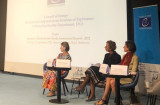News & events
Armenia’s Media Sector Needs Assessment Report presented at public Event in Yerevan
27.09.2022

Armenia’s Media Sector Needs Assessment Report has been presented at the Event in Yerevan on 27 September with participation of Armenian authorities, members of Parliament as well as representatives of media and civil society.
The report represents solid grounds and a reliable baseline material and provides a comprehensive overview of the Armenian National legislative and institutional framework and landscape covering media freedom, freedom of expression, access to public information, public service media, aspects of compliance with Council of Europe standards, addressing existing challenges and offering recommendations to overcome them. The report was prepared and presented in Yerevan by two Council of Europe experts - Krisztina Rozgonyi and Shushan Doydoyan.
Speaking at the event, Ardita Abdiu, Head of Council of Europe’s Division for Cooperation on Freedom of Expression, DG-I, said that overall, one of the main conclusions of the Needs Assessment is that the current legal framework regulating the media sector in Armenia is outdated and not solid to fully enable and enhance freedom of expression and the media. There is a need for an urgent and comprehensive legal reform. And these reforms are being implemented in Armenia through a wave of priority actions, such as decriminalisation of the “grave insult” and ratification of the Council of Europe Convention on Access to Official Documents (Tromsø Convention) by Armenia in May 2020.
“It is a difficult period for Armenia, while the country is facing serious challenges to its security and stability. And it is a difficult time for the entire wider region, where the tensions have grown to an unprecedented level… In such times, there could be understandable and sometimes necessary impulses to restrict some freedoms, including the freedom of expression and media. We appreciate the importance of combatting disinformation and other forms of manipulation of public opinion. However, it is equally important that any measure taken in this context complies with the Council of Europe and other international standards and particularly with the Article 10 of the European Convention of Human Rights and the relevant case-law of the ECtHR”, she said.